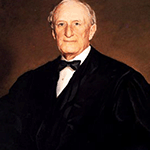
James Clark McReynolds (1914-1941)
Lived from 1862 to 1946.
Early Life and Legal Career
James C. McReynolds was born in Elkton, Kentucky. After graduating from Vanderbilt University in 1882 as valedictorian, McReynolds then enrolled in the University of Virginia School of Law. He completed his studies in fourteen months, and, once again, graduated in 1884 at the head of his class.
McReynolds began practicing law in Nashville, where he also served as secretary to Senator Howell Edmunds Jackson, who later went on to become an associate justice himself. After an unsuccessful ran for Congress in 1896, McReynolds began serving as Assistant Attorney General under President Theodore Roosevelt. Eventually, McReynolds went back into private practice and was retained by the U.S. government for matters relating to antitrust laws. In 1913, President Woodrow Wilson appointed McReynolds to the position of U.S. Attorney General.
Appointed to the Supreme Court
McReynolds was appointed to the Supreme Court of the United States by President Wilson on August 19, 1914. During the 27 years he spent on the Court, McReynolds authored 506 decisions and 157 dissents–93 of which were against the New Deal. McReynolds was eventually labeled one of the “Four Horsemen,” a group of conservative members on the Supreme Court that consistently struck down New Deal legislation.
McReynolds authored two early decisions using the Fourteenth Amendment to help protect civil liberties: Meyer v. Nebraska and Pierce v. Society of Sisters. Meyer involved a state law that prohibited the teaching of modern foreign languages in public schools. Meyer, who taught German in a Lutheran school, was convicted under the law. In the Court’s opinion, McReynolds wrote that the liberty guaranteed by the Due Process Clause of the Fourteenth Amendment included an individual’s right “to contract, to engage in any of the common occupations of life, to acquire useful knowledge, to marry, to establish a home and bring up children, to worship God according to the dictates of his conscience, and generally enjoy privilege, essential to the orderly pursuit of happiness by free men.” This decision survived the post-Lochner era.
Death
McReynolds died in Washington, D.C. on August 24, 1946 at age 84.








